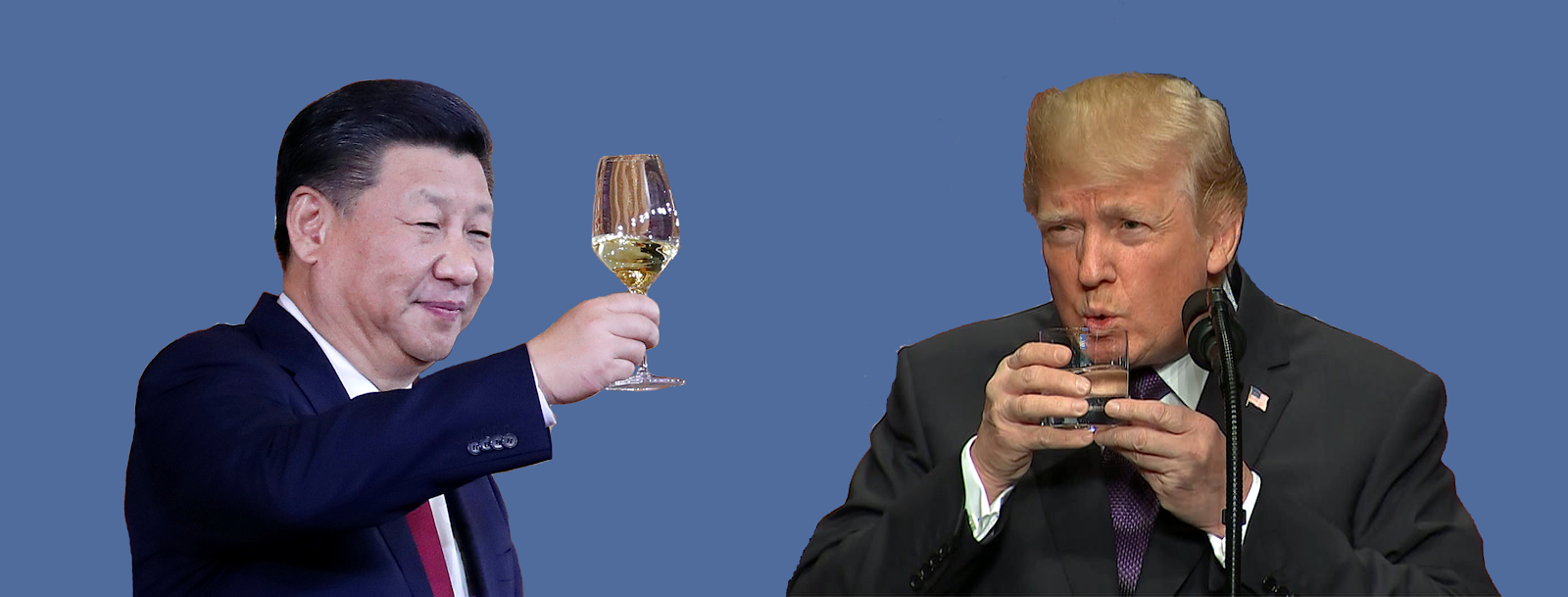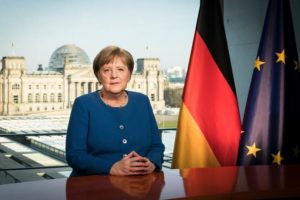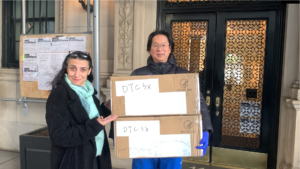Imagine if the U.S. had a president | The China Project COVID-19 updates for April 6, 2020

Photo credit: The China Project original illustration
Hi readers,
Imagine if the U.S. had a president who in late January, when the first COVID-19 cases were diagnosed in America, immediately tasked team members — privately, without raising public alarms unnecessarily early — to build up mathematical models, increase testing capacity, proactively look into what countermeasures might be able to prevent significant spreading of the disease, and took an inventory of the nationwide stock of personal protective equipment, ventilators, and other things needed to keep people alive. If that all seems too much, doing anything other than downplaying the risks of the virus and comparing it to the seasonal flu would have been a start.
Imagine if the U.S. had a president — or a federal government organization aside from the president himself — that could take the thousands of ventilators lying unused across the United States and move them to New York and other cities where they are needed (and then redistribute them again to other places as the infections rise and fall in different places).
Imagine if the U.S. had a president who didn’t fail so badly at arranging domestic affairs that the Chinese government and its most famous businessperson (Jack Ma) weren’t the only people able to organize a solution. You read that correctly. The Chinese government together with the most famous business person in China (i.e. not a U.S. business leader) are the ones who were needed to come to the rescue in New York City in the United States of America in the year 2020. (See the article from Vox called, “After Trump couldn’t assure New York the federal government would send ventilators, China sent a supply.”)
Imagine if the U.S. had a president who hadn’t let the country slip into such a bad spot that it has had to freeze all U.S. exports of aid to the rest of the world.
Instead, it is China that is sending teams of doctors around the world to train other countries to battle COVID-19, helping countries set up distance-learning programs to keep elementary school students from falling behind, and orchestrating billions of dollars in aid to countries around the world.
Don’t get me wrong — it’s easy to point fingers at U.S. failures with the benefit of hindsight, and China is no hero in the global COVID-19 crisis. Indeed, early coverups in China may be largely to blame for the disease spreading globally and China’s overseas aid efforts are backfiring in many, many cases (see section below).
But my point is twofold, and it is this: there was nothing inevitable about the U.S.’s coronavirus disaster, but America’s loss of global power is inevitable if we keep making unforced errors of epic, global proportions.
If you are beginning to understand the influence China has on each and every one of us each and every day, a) continue reading to see a snippet of our premium daily The China Project ACCESS newsletter below in this email, and b) consider signing up for a $1 trial.
If there is one thing to get smart on with your newfound COVID-19 free time, it’s China.
– Bob Guterma
The China Project COO
Business as usual?
Markets around the world rallied on optimism that U.S. and European COVID-19 death rates have peaked. Asian markets were up 2-4%, European markets up 4-6%, and New York markets up about 7%.
About a week ago, I predicted that 5-10% intraday swings would be the norm until COVID-19 recedes from the foreground. Just to make sure we’re clear — I meant swings up and down. Let’s see what the rest of the month of April holds.
On the bright side, Morgan Stanley’s top U.S. equities strategist made the argument that markets likely won’t go back to the lows they saw a few weeks ago, so whatever volatility may unfold the next few weeks, perhaps the worst is indeed behind us.
Meanwhile in the real economy, where most of us live and earn our money, here is a collection of headlines that, collectively, indicate no one knows what the heck is really going to happen next.
- Will We Flunk Pandemic Economics? (NYT)
- U.S. Is Nowhere Close to Reopening the Economy, Experts Say (NYT)
- The Economy Will Survive the Coronavirus (WSJ)
- The Coronavirus Vindicates Capitalism (WSJ)
- Morgan Stanley releases new forecast showing U.S. economy may drop as much as 38% (Market Watch)
- Economists: Be skeptical of any claim the US economy will recover quickly (CNN)
+ One place where it is not business as usual is Wisconsin, where the state’s primary elections face an uncertain future as the governor and the courts disagree on how to proceed. This is but a small test run of what many more elections — and ultimately the national U.S. presidential elections in November — may be like in COVID times.
+ A tiger at the Bronx Zoo in New York tested positive for COVID-19, raising fears that certain animals and household pets may be another vector of the spread
China’s attempt to play the hero (probably) isn’t working
China’s global propaganda effort to sanitize its COVID-19 mistakes and promote its global beneficence does not seem to be working.
Last week South African mining magnate Blessings Ramoba tweeted:
The South African economy has already lost billions of rands due to Wuhan Virus. The Chinese government must cancel the debt owed by South Africa as a sign of remorse. Where is South Africa going to get money to pay them back, in addition to causing the deaths of our innocent citizens?
Yesterday, Harry Cole, deputy political editor of the British tabloid Mail on Sunday, tweeted:
Britain should pursue the Chinese government through international courts for £351 billion [$430 billion] in coronavirus compensation, a major study into the crisis has concluded.
See also the Wall Street Journal: Britain falls out of love with China (paywall).
Indian news website Republic World says:
Pakistan’s ‘all-weather friend’ China had promised to send top-quality N-95 masks to the country affected by Coronavirus. However, [the masks] later turned out to be made from underwear, a Pakistani news channel reported.
In Nigeria, public health authorities are struggling “to dispel rumors that donated Chinese test kits are infected with COVID-19,” reports the China Africa Project.
Some Chinese citizens are also unconvinced. From the excellent blog Credible Target:
Here is [a translation of] the essay by Rèn Zhìqiáng 任志强, the piece which he shared with friends a few weeks ago, and which has him detained. It is smart, outspoken and plainspoken, filled with anger over the Party’s failures and Xi’s personal refusal to accept responsibility, as well as concerned about the future of his country. It is no holds barred stuff.
There are also voices calling for friendship and cooperation, at least between the U.S. and China, where the greatest faultline in the COVID-19 blame game lies. China’s ambassador to the U.S. Cuī Tiānkǎi 崔天凯 writes in the New York Times that China and the U.S. must cooperate against the coronavirus, while New York governor Andrew Cuomo thanked the Chinese government for facilitating a donation of 1,000 ventilators to the state. In Foreign Policy (porous paywall), Wendy Cutler and Daniel Russel argue that “COVID-19 might be a rare chance for the two countries to come together—if they can listen to their better angels.”
It’s hard to be hopeful though, if you listen to this podcast interview with former New Yorker correspondent in Beijing Evan Osnos: The coronavirus has pushed U.S.-China relations to their worst point since Mao.
Around the world in 30 seconds
- England Boris Johnson, who was among the world leaders who initially dismissed the seriousness of the threat coronavirus posed, was moved to the intensive care unit in a London hospital today.
- Japan After early success in limiting the spread of coronavirus, Japan is likely to enter an official state of emergency tomorrow (Tuesday) as the number of cases has risen increasingly quickly in recent days. The country still has a small number of cases compared to many nations, but nonetheless the case count has doubled in less than a week, and that’s with sub-standard testing (i.e. the likely number of cases is much higher).
- Europe Spain’s death rate slowed, showing signs that the curve may be flattening. Italy’s case count slowed down, too. Meanwhile, Germany’s government said it cannot say for sure when social distancing and business closure measures will be lifted.






